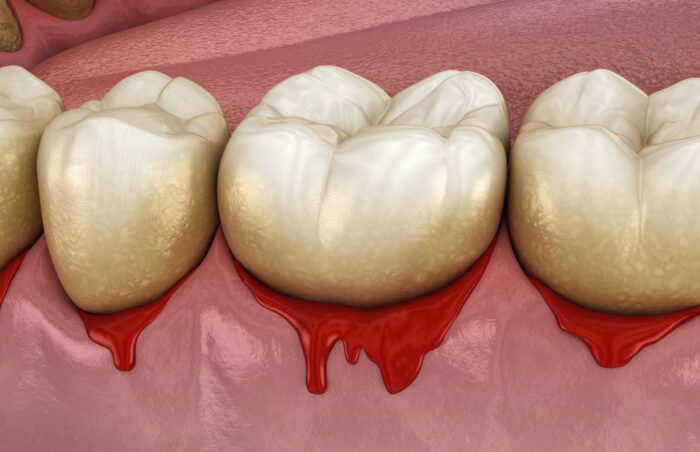Generally speaking, bleeding is never a good sign. While some cases of bleeding gums in Fayetteville, AR, could be no cause for concern, others may be signs of gum disease. Our gums are connected to the rest of our body through nerves and blood vessels. If they become infected or diseased, it could affect the rest of your health. Seeking treatment for bleeding gums may be able to help improve your oral health and even lower your risk for certain medical conditions.

Causes and Treatment for Bleeding Gums in Fayetteville, AR
Sometimes, our gums can bleed if there’s a piece of food stuck between our teeth. Other times, bleeding could be the result of physical trauma. But bleeding gums is also one of the early warning signs of gum disease. If left untreated, gum disease could cause serious complications in your oral health. It may also increase your risk of developing heart disease or other cardiovascular problems. If you notice you have bleeding gums, especially after brushing or flossing, contact your dentist for an exam.
What to Do If Your Gums Bleed
When we start bleeding, it can be easy to feel a little panicked. But the situation may not be all that severe. If you notice bleeding in your gums, you may only have a minor issue that could be treated with at-home procedures. First, try rinsing your mouth out with water and gently flossing the area. Many times, a stuck piece of food could lead to gum damage. You may notice that the affected area is a little swollen or sensitive. Avoid chewing on that side of your mouth, and keep an eye on it for a day or two. If the bleeding persists or is accompanied by a sharp pain, then it’s time to call your dentist for an exam.
Treatment Options for Bleeding Gums
In the case of physical trauma, your dentist may need to perform restorative treatment on your teeth. If the gums suffer extreme damage, you may need periodontal (gum) surgery to repair the damaged tissue. Our bodies do have natural healing processes that can help restore our gums after damage. But dental treatment may be necessary to protect against disease and decay in the meantime.
If you have gum disease, however, treatment may look different. While advanced periodontitis may require oral surgery, you may also be able to treat gum disease with less invasive procedures. If you catch gum disease early on, when the bleeding first starts, you could treat it with a simple antibacterial rinse. But if gum disease advances further, you may need a deep cleaning, known as scaling and root planing, to help heal your gums.
Life After Gum Disease
Gum disease can cause pockets to form on your gum line. These make it difficult to properly brush and floss your teeth. To help avoid further disease or decay, your dentist may recommend a periodontal maintenance hygiene schedule. By getting a cleaning every three months, you could help prevent gum disease from returning.
If you have bleeding gums, Greenway Dental Care is here to help. Call our office today at (479) 217-3178 to schedule a consultation and see if gum disease could be the culprit.
